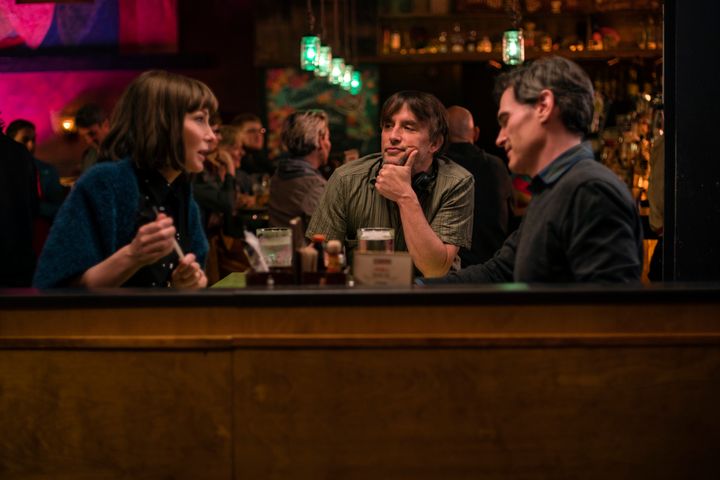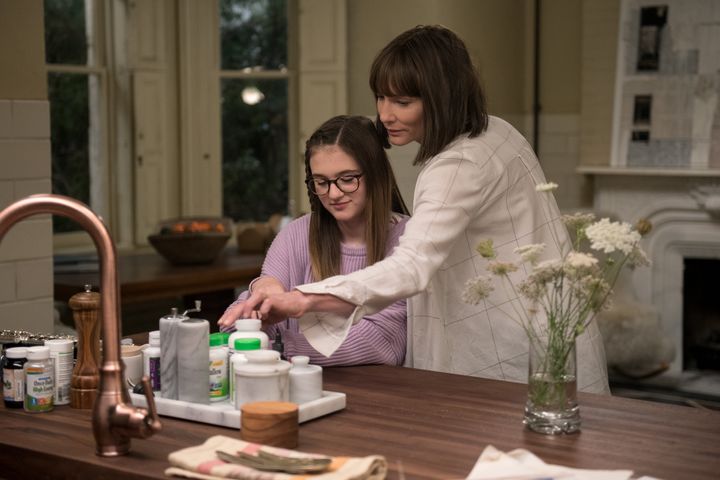[ad_1]
The novel “Where’d You Go, Bernadette,” which in 2012 became a cherished bestseller, opens with a brief preface narrated by 15-year-old Bee Branch. “Just because it’s complicated, just because you think you can’t ever know everything about another person, it doesn’t mean you can’t try,” she says. The person Bee longs to know everything about is her mother, the titular Bernadette, a clever but erratic misanthrope who has vanished from her semi-reclusive Seattle existence without warning.
For Richard Linklater, that quote was the beacon that guided his new big-screen adaptation of “Where’d You Go, Bernadette.”
Bernadette (Cate Blanchett), after all, is an enigma, as misunderstood by herself as she is by the patronizing parents at Bee’s school, who believe the once-celebrated architect to be little more than a tempestuous crackpot. In Maria Semple’s book, Bernadette’s saga unfolds largely through letters, emails, FBI reports, an emergency-room bill and other documents that don’t easily translate to the visual medium of film. In exorcising Semple’s unconventional structure, Linklater returned to those cogent words from Bee. All he could do was try to understand Bernadette and help the movie’s audience do the same.
“There’s an experimental filmmaker in me who goes, ’Yeah, let’s do this very literally like [the novel],’” Linklater said. “But the cinematic storyteller in me goes, ‘Oh, well, that’s actually distancing.’ It’s a literary device that obviously works brilliantly on the page, but for cinematic storytelling, it’s something else entirely. In some other world, there’s a very different version of this. You could probably make an extremely funny, wacky, screwball-y comedy. I mean, the film is still funny and quirky, I hope, but I think it goes into these deeper areas. There’s an emotionality.”

Getting to that tender core wasn’t a simple task for Annapurna Pictures, the indie studio behind “Vice” and “Sorry to Bother You.” Annapurna acquired the rights to “Bernadette” in early 2013, when it was a freshly minted sensation. Scott Neustadter and Michael H. Weber, the well-known writing partners whose credits include “(500) Days of Summer” and “The Disaster Artist,” then penned a script. But when Annapurna founder Megan Ellison ― daughter of billionaire Oracle executive Larry Ellison ― started courting Linklater for the director’s chair, she didn’t disclose the existing screenplay.
“She wanted my take,” Linklater recalled. “I think she liked it when I told her, ‘Oh, Bernadette’s not crazy at all. She’s got these issues, but the world’s crazy. She’s just misinterpreted.’ It’s a tricky adaptation. You don’t want people to think Bernadette is mentally ill. It’s a dance. In a film, a little bit indicates a lot, whereas in a book, you can go pages and pages and it’s hilarious. In the film, you represent something and it becomes real.”
Linklater ― the industry veteran responsible for “Dazed and Confused,” the “Before” trilogy, “School of Rock” and “Boyhood” ― said Ellison eventually mentioned Neustadter and Weber’s script but instructed him not to read it. By the time he was conversing with Blanchett about the lead role, Linklater had begun from scratch alongside “Me and Orson Welles” scribes Holly Gent and Vince Palmo.
Plenty of movies go through extensive revisions, but this particular trajectory accentuates what was always true of Semple’s charming novel: It’s a hard text to adapt, with its revolving door of narrators and gradual trickle of exposition. (A representative for Semple said she was not available to comment for this article.)
“It was constantly evolving,” Blanchett said. “It’s an epistolary novel, and it’s written really subjectively, with Bernadette completely hidden from herself about her behavior. There’s a kind of glorious relentlessness to Bernadette in the novel. Rick was saying, ‘We have to find a way where that has an outlet, but we can’t watch that for two hours.’ In a way, you ask different questions when you see something than when you read it. So there were a lot of things that Rick felt he needed to solve structurally in order to make the translation. That’s what makes the book a glorious read and hopefully what makes the film a sidestep.”

Linklater and Blanchett agreed that Bernadette is a victim of creative failure who now lacks a way to channel her ingenuity. Bernadette’s prized achievement, a large house constructed entirely from locally sourced eco-friendly goods, won her a MacArthur genius grant and worldwide renown. But some bad luck resulted in the building’s destruction, and Bernadette’s stability came crashing down with it. Furthermore, she hasn’t properly coped with a series of miscarriages she experienced before Bee was born. Today, her closest ally ― other than her daughter and brainy Microsoft husband (Billy Crudup) ― is a virtual assistant in India to whom she outsources everything from dinner reservations to medical remedies.
When we meet Bernadette in the movie, she’s sparring with a neighbor (Kristen Wiig) ― in her words, a “gnat” ― who commands her to hire a landscaper to remove the overgrown blackberry vines spilling out of her yard. From there, the conflicts and mishaps in Bernadette’s orbit only escalate, further distancing her from reality. When everything erupts and her hubby stages an intervention, she flees, leaving Bee scrambling to piece together her mother’s whereabouts. Bernadette goes missing from a significant chunk of the novel, but that mystery is truncated in the film so that Blanchett never leaves the screen for long.
“I didn’t pathologize her because I think she’s confounding and hopefully frustrating in a hilarious kind of way,” Blanchett said. “Rather than looking at all of that stuff and dealing with it, she’s thrown herself into her daughter’s life and turned the problem outwards. She’s contemptful of corn chips, the mothers at the school, the traffic in Seattle. Rather than looking at herself, she’s full of contempt for everyone except for her beloved daughter and her husband. And they end up being the people that she lets down the most.”
In addition to the script hurdles, “Where’d You Go, Bernadette” has seen a puzzling rollout at a time when projects without franchise affiliations are struggling to turn profits. The movie, shot in 2017, was first slated to hit theaters in May 2018. Three months before, Annapurna pushed the release to October. The studio, which recently faced bankruptcy rumors stemming from underperforming films like “Booksmart” and “If Beale Street Could Talk,” has since delayed “Bernadette” an additional three times. According to a Variety report from earlier this year, an Annapurna rep said the company hoped to attract the female-skewing audiences that have turned out for previous August titles such as “Crazy Rich Asians” and “Julie & Julia.”
But one-off hits aside, August is an especially tough launchpad, caught between the deluge of summer blockbusters and the start of awards season. Broadly speaking, Hollywood has come to treat it as a dumping ground for movies that don’t fit either category. Not even a starry cast, revered director and popular source material can guarantee a home run.
Does the move imply that Annapurna has lost faith in a film that wasn’t easy to make in the first place? Linklater, for his part, doesn’t see it that way.
“The theatrical marketplace for a film like this that isn’t a franchise is a delicate thing,” Linklater said. “Things have changed so much in the last five or six years. I realized they were doing the opposite of dumping the movie. They cared so much. I had to tell other people, ‘If they were dumping it, they would have already dumped it.’ The film’s always worked. Fortunately, I came in under budget, so when they first pushed the release date, it gave me more time to keep working on it, which I never complained about because I was still feeling my way through this. The adaption never stopped, so I appreciated those extra few months.”
“Where’d You Go, Bernadette” opens Aug. 16.
REAL LIFE. REAL NEWS. REAL VOICES.
Help us tell more of the stories that matter from voices that too often remain unheard.
[ad_2]
Source link

